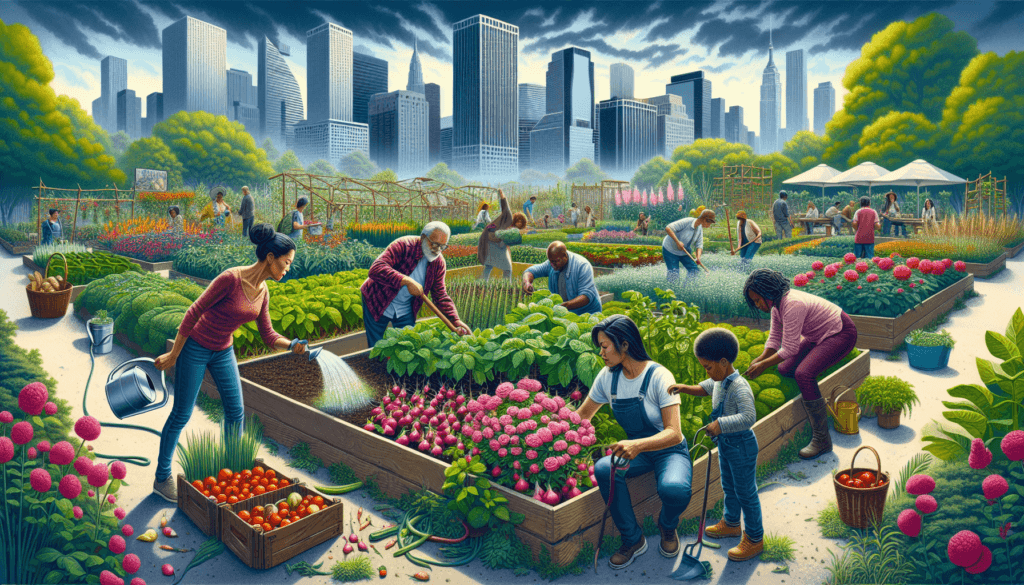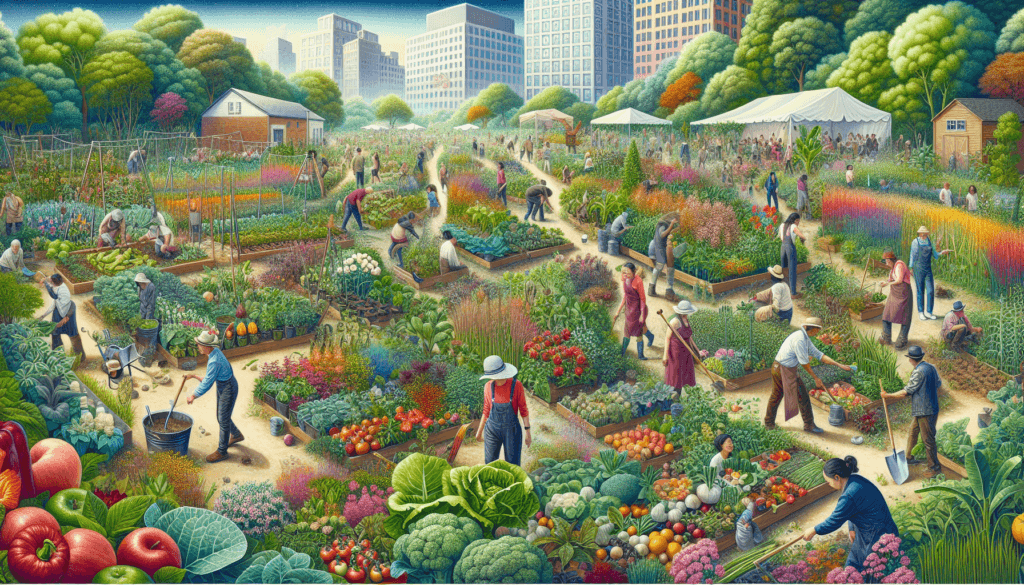Have you ever wondered what makes community gardens so popular among urban residents? It seems like these green spaces are popping up all over cities, enticing locals to get their hands dirty and grow their own food. But what is it about community gardens that draws people in? Is it the chance to connect with nature in a bustling urban environment? Or is it the opportunity to build a sense of community and camaraderie with fellow gardeners? In this article, we will explore the factors that make community gardens such a hit among urban dwellers. So grab your gardening gloves and let’s dig in!

The Benefits of Community Gardens
Community gardens have become increasingly popular among urban residents due to the wide range of benefits they provide. These benefits can be categorized into environmental, health, social, educational, and practical aspects. Let’s explore each of these aspects in detail.
Environmental Benefits
One of the primary advantages of community gardens is the positive impact they have on the environment. In urban areas, green spaces are often limited, and community gardens create an opportunity to counteract this by introducing more vegetation. This helps mitigate the effects of urban heat islands and air pollution, thereby improving the overall air quality in the neighborhood. Additionally, community gardens also serve as habitats for various pollinators like bees and butterflies, supporting local biodiversity.
Health Benefits
Community gardens offer numerous health benefits to urban residents. One of the key advantages is access to fresh and healthy food. In many urban areas, it can be challenging to find affordable, nutritious produce. By participating in community gardening, individuals can address this issue by growing their own fruits, vegetables, and herbs. This not only ensures access to high-quality, organic food but also encourages the consumption of fresh produce, leading to improved nutrition and better health outcomes.
Social Benefits
Engaging with a community garden can foster a strong sense of connection and belonging among residents. These shared green spaces provide an opportunity for people to meet and interact with their neighbors, strengthening social ties within the community. By working cooperatively towards a common goal, community gardeners build a sense of camaraderie and support. Additionally, community gardens often organize events and activities, further promoting social interaction and creating a vibrant and inclusive community spirit.
Access to Fresh and Healthy Food
Addressing Food Deserts
Community gardens play a crucial role in addressing the issue of food deserts in urban areas. Food deserts are areas where residents have limited access to affordable and nutritious food. By establishing community gardens in these areas, residents can bypass the need to rely solely on convenience stores or fast-food options for their meals. Instead, they can grow their own fresh and healthy produce, ensuring a more balanced and sustainable diet for themselves and their families.
Improving Food Security
Community gardens also contribute to improving overall food security in urban neighborhoods. In times of economic instability or crises, access to affordable and nutritious food can become even more challenging for vulnerable populations. By actively participating in a community garden, individuals become less reliant on external sources for their food needs. This self-sufficiency helps ensure a constant supply of fresh produce, even during times of limited availability.
Promoting a Healthy Lifestyle
Engaging in community gardening promotes a healthier lifestyle for urban residents. Gardening itself offers physical activity that can help improve cardiovascular health, muscle strength, and flexibility. Spending time outdoors, interacting with nature, and getting your hands dirty are also known to reduce stress levels and boost mental well-being. Furthermore, the availability of fresh produce from community gardens encourages healthier eating habits, leading to a more balanced and nutritious diet.

Connecting with Nature in Urban Environments
Escape from the Concrete Jungle
Urban environments are often characterized by concrete and limited green spaces. Community gardens offer a much-needed escape from the bustling city life and provide residents with an opportunity to connect with nature. These oases of greenery allow individuals to experience the peace and tranquility that come with being surrounded by plants, flowers, and trees. This connection with nature has proven benefits for mental health and overall well-being.
Creating Green Spaces
Community gardens contribute to the creation of green spaces within urban areas. These green spaces serve as vital habitats for various birds, insects, and other wildlife, contributing to the preservation of biodiversity. Additionally, the presence of green spaces helps improve air and water quality, reduce noise pollution, and provide shade during hot summer months. These benefits enhance the overall livability and aesthetics of the neighborhood, making it a more pleasant and welcoming place to reside.
Opportunity for Outdoor Recreation
With the limited availability of parks and recreational areas in urban environments, community gardens offer an excellent opportunity for outdoor recreation. Whether it’s tending to the plants, engaging in gardening workshops, or simply enjoying the beauty of the garden, these spaces provide a chance for individuals and families to spend quality time outdoors. This promotes physical activity, relaxation, and a deeper appreciation for the natural world.
Sense of Community and Belonging
Meet and Interact with Neighbors
Community gardens are powerful catalysts for fostering a sense of community and belonging. By engaging in gardening activities, individuals have the chance to meet and interact with their neighbors, breaking down social barriers and building connections. Working together towards a shared goal of creating and maintaining a beautiful garden strengthens community bonds, creating a network of individuals who support and uplift each other.
Enhance Social Connections
Beyond meeting neighbors, community gardens also provide a platform for individuals with shared interests to connect. Whether it’s through specialized gardening clubs, cooking workshops, or educational programs, community gardens offer numerous avenues for like-minded people to come together and share their knowledge and experiences. These connections enhance social interactions and create a support network that extends beyond the realm of gardening.
Foster a Sense of Belonging
Engaging with a community garden fosters a sense of belonging and ownership among urban residents. By actively contributing to the development and maintenance of the garden, individuals feel a deep connection to the space and to their community as a whole. This sense of belonging often extends beyond the actual garden, leading to increased civic engagement and a commitment to the overall well-being and improvement of the neighborhood.

Educational Opportunities
Learning about Gardening and Agriculture
Community gardens present abundant educational opportunities. They serve as living classrooms where individuals can learn about various aspects of gardening, agriculture, and horticulture. Gardening workshops, expert-led training sessions, and hands-on experience provide valuable knowledge on topics such as soil health, crop rotation, plant care, and pest management. This practical knowledge can empower individuals to grow their own food and contribute to sustainable food systems.
Teaching Sustainability
Sustainability is a critical topic in today’s world, and community gardens serve as effective platforms for teaching sustainable practices. Through workshops and educational programs, participants can learn about composting, water conservation, organic gardening, and other eco-friendly techniques. This knowledge not only benefits the individual gardeners but also contributes to broader environmental awareness and promotes conscious decision-making in daily life.
Promoting Environmental Awareness
Community gardens play a vital role in promoting environmental awareness and instilling a sense of responsibility towards the natural world. By actively engaging in gardening practices, individuals gain a deeper understanding of the interdependence between human activities and the environment. This awareness often translates into more environmentally conscious behaviors, such as reducing waste, conserving resources, and making sustainable choices in other areas of their lives.
Cultivating a Green Thumb
Developing Gardening Skills
Community gardens provide hands-on opportunities for individuals to develop and refine their gardening skills. Whether you are a beginner or an experienced gardener, community gardens offer a supportive environment to learn from others, exchange tips and advice, and gain practical experience. Over time, individuals develop a green thumb and become proficient in various gardening techniques, leading to increased success in growing their own plants and crops.
Engaging in a Therapeutic Hobby
Gardening is not just a productive hobby; it also offers numerous therapeutic benefits. Engaging in gardening activities can help reduce stress, anxiety, and depression. The act of nurturing plants and watching them grow provides a sense of purpose and accomplishment. The repetitive motions, pleasant scents, and soothing sounds of nature create a calming and rejuvenating experience, allowing individuals to reconnect with themselves and find solace amidst the chaos of urban life.
Creating a Beautiful and Vibrant Environment
Community gardens have the power to transform urban spaces into beautiful and vibrant landscapes. By cultivating a wide variety of plants, flowers, and trees, community gardeners can create visually stunning and colorful environments. These gardens serve as focal points within neighborhoods, enhancing the aesthetic appeal of the area and creating a positive and welcoming atmosphere for residents and visitors alike. The beauty of these gardens uplifts the spirits of all who encounter them, making the community a more pleasant place to live.

Promoting Community Engagement
Involving Residents in Decision-Making
Community gardens provide a platform for residents to actively engage in decision-making processes that affect their neighborhoods. From choosing the types of plants to grow to deciding on garden designs and organizing events, community gardeners have the opportunity to shape their shared space according to their desires and needs. This involvement fosters a sense of ownership and empowerment among residents and ensures that the garden reflects the collective vision of the community.
Encouraging Volunteerism
Community gardening relies heavily on volunteerism and community participation. By encouraging individuals to volunteer their time and skills, community gardens create opportunities for people to give back to their community in a meaningful way. Volunteering in community gardens not only benefits the garden itself but also provides individuals with a sense of purpose, fulfillment, and a chance to connect with others who share a similar passion for gardening and community improvement.
Organizing Events and Activities
Community gardens frequently organize events and activities that bring people together. These events can include garden parties, harvest festivals, workshops, cooking demonstrations, and educational programs. By organizing such activities, community gardens create opportunities for individuals to socialize, learn, and celebrate their shared achievements. These events also attract visitors from outside the neighborhood, promoting community engagement and fostering a sense of pride in the local community among residents.
Access to Limited Space
Utilizing Urban Space Efficiently
Community gardens provide a practical solution for utilizing limited urban space efficiently. In densely populated urban areas, land availability for individual gardens is scarce. By pooling resources and sharing a communal garden space, urban residents can maximize the use of available land. This utilizes the space more effectively and allows a greater number of people to engage in gardening, even if they have limited access to their own private outdoor areas.
Maximizing Land Use
Community gardens offer an opportunity to maximize land use within urban environments. Instead of leaving vacant lots or unused spaces, community gardens transform these areas into productive and purposeful landscapes. They convert underutilized land into sources of fresh produce, beauty, and community engagement. This sustainable use of land contributes to the overall improvement and revitalization of urban neighborhoods.
Creating Pocket Gardens and Rooftop Gardens
Community gardens are not limited to traditional ground-level spaces. In urban environments, where ground space may be limited, various alternatives can be explored. Pocket gardens, which are small-scale gardens created in unused corners or small plots, provide opportunities for gardening in unexpected spaces. Rooftop gardens also offer a unique solution, utilizing the roof areas of buildings to create green, productive spaces. These innovative approaches further expand access to gardening and greenery in urban areas.

Encouraging Sustainable Practices
Composting and Waste Reduction
Community gardens promote sustainable practices, such as composting and waste reduction. Organic waste generated within the community can be transformed into nutrient-rich compost, which fertilizes the garden and reduces the need for artificial fertilizers. Additionally, community gardens often engage in waste reduction efforts through recycling initiatives and encouraging responsible waste management practices. These sustainable practices contribute to a healthier and more environmentally conscious community.
Rainwater Harvesting
Community gardens can incorporate rainwater harvesting systems to conserve water and reduce reliance on external water sources. Rainwater can be collected and stored in tanks or barrels, ensuring a sustainable supply of water for the garden. By utilizing rainwater, community gardens minimize the strain on municipal water supplies and promote responsible water usage within the urban environment.
Using Organic and Natural Methods
Another way community gardens encourage sustainable practices is by promoting organic and natural gardening methods. Instead of relying on synthetic pesticides and fertilizers, community gardeners emphasize the use of organic and natural alternatives. This reduces the environmental impact of gardening activities and ensures that the produce grown in these gardens is free from harmful chemicals. By practicing sustainable gardening techniques, community gardeners contribute to the overall health of the ecosystem and support the creation of more environmentally friendly urban spaces.
Addressing Mental Health Challenges
Creating Stress-Relieving Environments
Community gardens provide a soothing and stress-relieving environment for urban residents. The act of gardening, surrounded by nature and away from the hustle and bustle of city life, offers respite from daily stressors. Engaging with plants and soil has been shown to lower cortisol levels, the hormone associated with stress. The process of nurturing plants and witnessing their growth provides a sense of tranquility and fulfillment, enhancing mental well-being and promoting overall emotional balance.
Offering a Sense of Purpose
Community gardens offer individuals a sense of purpose and accomplishment. For urban residents who may feel disconnected from nature or lack a larger purpose in their daily lives, community gardening provides a meaningful and tangible way to contribute to something greater than themselves. By actively participating in the cultivation of a garden, individuals find purpose in nurturing and caring for living organisms, instilling a sense of responsibility and satisfaction.
Supporting Emotional Well-being
Engaging with a community garden fosters emotional well-being and resilience. Gardening has been found to reduce symptoms of depression and anxiety, boost self-esteem, and improve overall mood. The combination of physical activity, exposure to natural elements, and the sense of community that community gardens provide creates a supportive and nurturing environment for emotional healing and growth. The opportunity to share experiences, seek advice, and receive support from fellow gardeners further enhances the emotional well-being of individuals.
In conclusion, community gardens offer a plethora of benefits to urban residents. From promoting environmental sustainability and improving food security to enhancing mental health and fostering a strong sense of community, these shared green spaces provide an oasis of nature and connection within bustling cities. By embracing community gardening, individuals can reap the rewards of fresh and healthy food, connect with nature, forge new relationships, learn valuable skills, engage in meaningful activities, and contribute to the well-being of their communities. So why not grab a shovel and join a community garden near you? You’ll not only cultivate a green thumb but also nurture a vibrant and resilient community.


